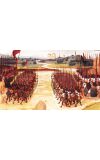
11 Sep 2011 04:33:10
At the height of last month's riots, the BBC issued an edict. It told its staff that henceforth they were to describe the disturbances not as "British" but as "English". Anyone familiar with the corporation's nervous system will have instantly detected a response to Celtic whinges. Like so many reflections of the infirmity of the United Kingdom, there was nothing you could object to in this ruling: the riots really did happen in "English" cities. Perhaps they reflected a uniquely English malaise. But the urge to set themselves apart from the palsied political arrangement in which we live is increasingly instinctive in the Scots and the Welsh. Apart from over-representation in the Westminster parliament and a disproportionate share of public spending, the Welsh and Scots have a growing taste for asserting the identities they had before the United Kingdom was invented.
The English have yet to do so, and most of the time, the English, a relatively easy-going and conservative people, ignore the fire-breathing on their borders. If and when the point comes at which Scotland and Wales decide they've had enough of the whole thing and opt for independence, the English will shrug their shoulders and go back to their DIY, their gardens and their car-boot sales. They will react as if watching the divorce of a couple of well-liked friends: a bit sorry, but recognising there is nothing they can do about it.
But if our political masters have their way, England will have no say in the divorce and will remain sat upon by "Great Britain" forever. For the most part, the English seem committed to the union – in a dozy "what's the point of changing things?" sort of way. Separation would deprive the Labour party of a stage army of biddable dead-beats. And while we are repeatedly told that an English parliament would be more-or-less permanently Tory, for some reason, that is less appealing to the Conservatives than a sentimental attachment to a 300-year-old political fix. I blame Sir Walter Scott. The Liberal Democrats – four of whose six leaders have come from Scotland – agonise.
Not that anyone dreams of offering the English people a vote on the subject, or even a parliament to match the ones in Scotland, Wales or Northern Ireland: the union is supposedly a relationship of two equal nations, but its fate is not. The English are not to be trusted with self-government, and have shown little sign of demanding it. The Secret People, GK Chesterton called them, "that never have spoken yet". But Westminster can rest easy for the moment: the last thing on the minds of the rioters was "we must have an English parliament."
As Simon Jenkins concedes in A Short History of England, "Britishness" was forged through war, industrial expansion and, absolutely crucially, the building of an empire. With the empire gone and the United Kingdom a part of the European Union, it is a political identity which increasingly feels like an unnecessary woollen sweater on a warm summer's day, one layer of political clothing too many: it is oddly appropriate that English nationalism has been commandeered for the moment by swaggering boot-boys in T-shirts. But how long can nationalism remain their preserve? The Westminster dullards' inability to imagine casting off a surplus piece of political clothing is no reason for the rest of the English to feel the same way indefinitely.
First, of course, the English need to define who they are. There is no racial answer to this question, for we are a people formed by immigration. Jenkins (a Welshman by descent, I suppose) recognises the critical power of history in crystallising a sense of English identity. Understand the forces which have collided time and again in our national development and you begin to grasp what has made us who we are. This is why the neglect of history teaching in schools is such a calamity. Anything which makes the history of England available and intelligible to all is A Good Thing. It is also very political.
Jenkins is one of the liveliest commentators at work in Britain, always worth reading and pleasingly contrarian. But he is also a great panjandrum who chairs the National Trust, on whose behalf he has written this book. And what are we to say of the National Trust? Of course, it's a force for good. But it is also like an unapproachable distant relative who somehow, without ever obviously intending any such thing, makes you feel gauche and inadequate. Can anyone see its oakleaf emblem without checking to see their flies are done up?
A Short History of England is the product of this union, and it will sell well enough to the sort of decent, civically engaged people who join the NT. It is a heavy thing, with lots of pictures, most of them accompanied by rather dull captions. (An entire page is devoted to a photograph carrying the remarkable text "The marriage of Prince Charles to Lady Diana Spencer attracted global attention and displayed England's continued talent for ceremonial.") The need for heavy photographic paper means that you cannot read the book comfortably in bed. But it is far from clear that reading it – in bed, or anywhere else – is the intention. Its function seems to be more to sit on a glass-topped table.
A few years ago Jenkins had a rather original idea, England's Thousand Best Churches, which also weighed in rather heavy. But that was a proper book, the pictures seeming merely to illustrate the text. In A Short History of England, the writing has been so constrained (to make space for the pictures, presumably) that the great essayist is often reduced to the level of a plodding primary school teacher. It will do for anyone who wants to know their danegeld from their Dalriada, but one hopes for more.

